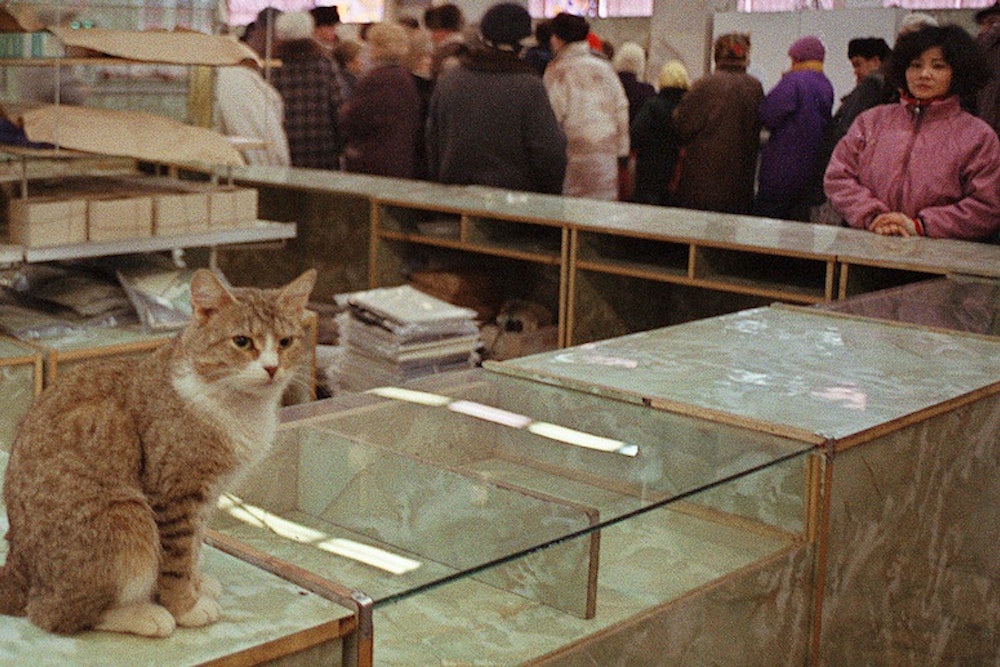Today, "with the goal of protecting Russia's national interests," Vladimir Putin issued a decree "banning or limiting" the import of food stuffs from countries that imposed sanctions on Russia after pro-Russian separatists shot down Malaysia Airlines Flight 17 in Ukraine. That includes the United States, the European Union, Japan, Australia, and Canada. Russia, despite once being the bread basket of Europe, now imports 40 percent of its food. And even if local growers and producers step up to fill the gap left by the ban, it will still take a long time and the transition will be rough.
While the language of the ukase is vague—Putin also directs the government to determine which goods to ban or limit, and how (this, one Russian opposition activist pointed out, will just lead to importers lining up outside bureaucrats' offices with suitcases of cash)—the Russian blogosphere has lost no time in panicking. (The Twitter account of DozhdTV, the independent Russian channel, tweeted: "American whiskey, Dutch cheeses, German beer, Australian beef, Greek olives. Say bye-bye to all that.")
Вообще-то Кремль уже когда-то назло Западу запрещал все иностранные продукты и выглядело это так: pic.twitter.com/ABJtMdiVYh
— Roman Dobrokhotov (@Dobrokhotov) August 5, 2014(Translation: You know, the Kremlin already banned imports to spite the West once upon a time, and it looked like this.)
ура, наконец-то Путин запретил еду, один вред от нее
— Yury Saprykin (@sapr21) August 6, 2014(Translation: Hooray! Putin has finally banned food. It's so annoying anyway.)
Наличие в наших магазинах разнообразных продуктов питания — это величайшая геополитическая катастрофа XX века.
— Пeрзидент Роисси (@KermlinRussia) August 6, 2014(Translation: The presence of a diverse array of foodstuffs in our grocery stores is the biggest geopolitical catastrophe of the 20th century.)
PUTIN DECLARES HUNGER STRIKE (on behalf of russia)
— Ilya Mouzykantskii (@ilyamuz) August 6, 2014Expat journalists joined in the freak-out, too, because life in pre-decree Moscow is good. Really good. Especially if you are the sort of Muscovite and foreigner who can afford to lounge in a trendy cafe sipping some lovely Sancerre or to saunter into a supermarket and buy some rich mozzarella, flown in right from Italy.
What's going to disappear from Russian shelves first? Is it French cheese, U.S. ketchup, or Dutch carrots?
— Albina Kovalyova (@agent_Alka) August 6, 2014I get that Moscow isn't Russia, but nonetheless, seriously, nearly every restaurant and grocery here will have to shut or change biz model.
— Joshua Yaffa (@yaffaesque) August 6, 2014While on vacation seeing reports of Russia limiting food imports.Should I buy up all the Croatian wine I can find in duty free shop here?
— Nataliya Vasilyeva (@NatVasilyevaAP) August 6, 2014Will Russian elite keep supporting Putin when there is only 1 type of horrible cheese and Crimean wine left to celebrate that oil bonus?
— Yulia Bragina (@YuliaSkyNews) August 6, 2014Oh fuck this, I am not drinking wine from Krasnodar/Crimea for the next year.
— Natalia Antonova (@NataliaAntonova) August 6, 2014 This is the thing. If the ban really does go through and is as wide-sweeping as the Russian blogosphere fears, it will hurt not America and not the E.U., but the class of people who are well-educated, well-paid, and well-traveled, who know the difference between a Nero d'Avola and a Nebbiolo, and between prosciutto and jamón serrano. That's a relatively small set of people, and it's also the people who went out into the streets in the winter of 2011-2012 to protest against Vladimir Putin: the urban middle class, or, as the Kremlin derisively dubbed them, the creacles (from the words for creative class).
Still, it will have a wider effect, too. Most restaurants in the country these days serve something from the E.U., things like Czech or German beer (a favorite of Russians of all stripes) and cheap Italian and French wines. Not to mention that much of the beef in Russian restaurants comes from Australia, which has already threatened to ban entry to Vladimir Putin. The ban won't go unnoticed outside the creative class.
And though the Kremlin voices stayed largely silent—they're the ones who live the best, drinking foreign wines and wearing luxe foreign clothes and driving blingy foreign cars and will be the least affected by the ban (the Soviet nomenklatura had plenty of access to foreign goods, after all)—one of the most acerbic and militant Putinists did weigh in.
У наших производителей продуктов появился исключительнейший шанс. Если и теперь обосрутся, то пусть не жалуются, что их говно никто не ест.
— Эдуард Багиров (@EduardBagirov) August 6, 2014Translation: Our food producers now have the opportunity of a lifetime. If they fuck it up now, then they should stop complaining that no one buys their shit.
